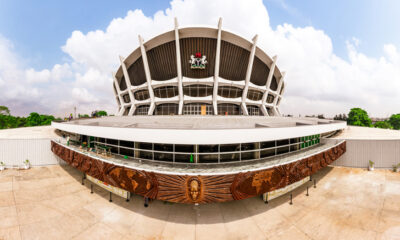News
Obasanjo Backs Call for Sale of Assets, Says Nigeria should Borrow, Spend Less & Earn More to Exit Recession
Former President Olusegun Obasanjo on Tuesday stressed the need for Nigeria to borrow, spend less and earn more to get out of the current economic recession.
Obasanjo said this in Abeokuta at the opening ceremony of the National Council On Finance and Economic Development Conference (NACOFED).
The theme of the conference is “Enhancing Revenue Generation and Obtaining Best Value for Money in Expenditure”.
According to Obasanjo, the major problem with Nigeria is that “we are spending more than we are earning and we have not been able to save for the rainy day”.
He, however, proffered a three-fold solution of borrowing, spending less and earning more to the economic challenges of the nation.
Obasanjo, who said that funds were available outside the country, advised that Nigeria needed to approach its allies who could lend to the country on reasonable terms.
He warned, however, that no such nation would part with its funds without observing that Nigeria was taking practical steps to come out of its challenges.
The former president said that Nigeria must encourage production to earn more and increase its revenue.
He said since the nation was not in control of oil, it should therefore diversify and concentrate on the things it could control.
Obasanjo, who stressed the need to develop agriculture, frowned at policies which tended to turn the nation into a dumping ground for other countries’ products.
“I was shocked when the ban on importation of toothpick which we imposed in 1977 was lifted four years ago. How can a nation seeking to rank among the best in the world continue like that? We must begin to do away with things that we can do without and if we must import them, let them attract very high duties,” he said.
Obasanjo, who backed the call for the sale of some national assets to raise money, described such act as natural.
The former president said port authorities and Nigeria National Petroleum Corporation (NNPC) were part of assets that Nigeria could partly sell to generate fund.
“I do not see why 49% of NNPC cannot be privatised. I think the problem is in the coinage ‘selling of asset’ as if we want to throw out our inheritance. What we are actually doing by that is simply re-organising. It should however be done transparently and let it actually go public and not to cabals, relations and friends. This is always the fear of Nigerians when issues like this arise,” he said.
Obasanjo expressed confidence in the ability of the Minister of Finance, Kemi Adeosun, saying that “she is doing a marvelous job in a difficult situation and that only time can prove her right”.
Adeosun, who spoke earlier, said that the Federal Government had till date invested over N700 billion to stimulate growth in the economy.
“We are working on an economic model that will change Nigeria from being consumption focused to investment focused,” she said.




















